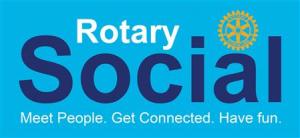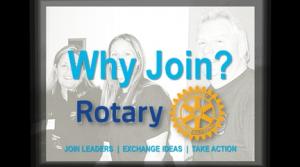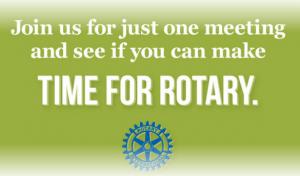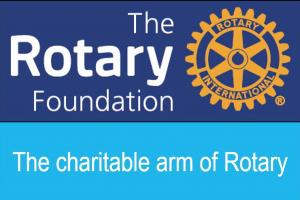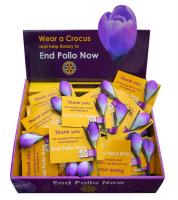Club Meeting - WATER AID
Wed, Mar 20th 2024 at 6:00 pm - 7:30 pm
Richard McMahon
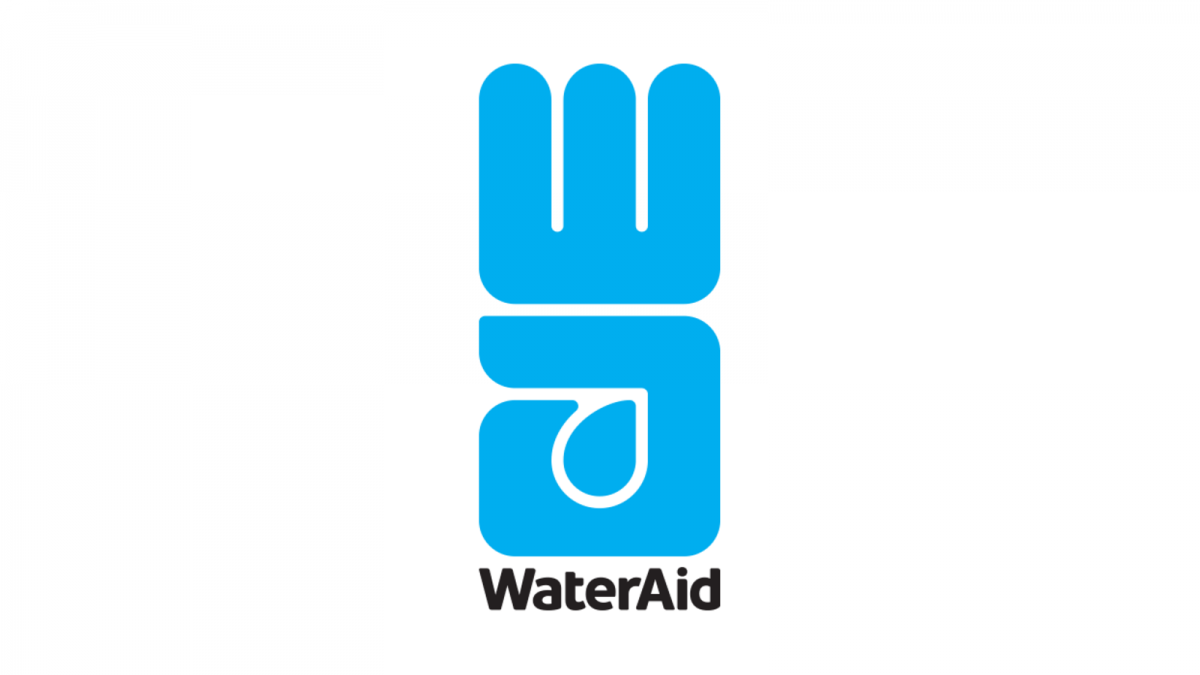
Club members please log in for more information.
Speaker: Richard McMahon, Water Aid
It’s hard to understand, given our current rainfall experiences, what it is to be like to have no water or dirty water……..
Richard thanked the Club for the invitation to speak. Richard is a volunteer and not employed by the charity and is part of a network of speakers who are willing to travel to speak for the charity; he lives near Banbury….. We can see how much we use water from drinking to flushing toilets to cleaning teeth, showering and much more - we take all this for granted. Think how your routines might change if you had to walk two or three miles, sometimes even twice a day to get the water you use? I am sure it would put quite a different complex on your usage. Richard reflected, his nearest river is three miles from where he lives - a 10 litre jerrycan weighs 10kgs and the burden is unimaginable to be carried on your head or back for that distance. Add to this the quality of the water which, even in this developed country, is not guaranteed to be good; some have no choice.
We looked at some startling statistics
l 1 in 10 have no water close to home - around 700 million people
l 1 in 5 have no decent toilets
l 800,000 plus die from diarrhoea related illnesses as a result of the quality of water they use.
l Diarrhoea caused by dirty water and poor toilets leads to the death of child every two minutes…..
WaterAid as a charity was started in 1981 in the UK, but with an international reach, reaching 38 different countries. Their aim is that everyone everywhere has safe and sustainable water, sanitation and hygiene by 2030. UNHCR is working towards the same outcomes with the WASH programme; the collective term for Water, Sanitation and Hygiene. Richard showed us a video talking about WASH and Health. Without clean, sustainable supplies sickness spreads but change this and the diarrhoea risk can be reduced by half. The video highlighted the consequences of the lack of clean water, including the inability to sterilise surgical instruments; think about health facilities without access to clean water! An example was shown of a woman taking a short walk to a river in Burkina Faso and finding it dry. The only way to get water is to dig down to the water but, of course it will be dirty. To fetch the water she had to take her children with her which meant her children could not go to school and she could not work as this journey would need to be undertaken more than once a day…… accessible clean water is vital for livelihood. No water/shortage of water means not being able to grow vegetables and therefore, a poor diet.
There are many solutions to the problems - some simple, some complex. For example:
l Rope pump
l Rainwater harvesting
l Hand dug well
l Bore holes
l Water kiosks
l Hand pumps
A water kiosk is a facility with treated water fed to the kiosk via a pipe network; it has up to four taps. These are more complicated and more costly than some of the other solutions and require organisations and communities working together. The benefits are obvious in that there is a ready supply of clean water close to homes which means children can go to school and parents can go to work. In short, water needs to be plentiful, reliable, affordable and accessible. WaterAid works with communities for a sustainable solution that can be managed locally by local peoples.
A toilet is something else we take for granted. There are significant numbers throughout the world without access to a toilet of any sort and people resort to ‘squatting in fields’…… Along with the health issues resulting from lack of/poor toilets comes lack of dignity and this is particularly difficult for young girls. Ironically more people have mobile phones than have access to a toilet! In places where there are toilets they are often single gender which again causes difficulties for young girls. The solution must be sustainable and safe disposal must be ensured. One example of a solution is composting toilets. For those who do not know or haven’t seen or used one - they typically have two seats with a collection area beneath and material e.g. sawdust is added after each use. Using one seat at a time there is always the other available whilst emptying is done. The resultant compost can be used in the garden to grow crops. If used and maintained correctly there is no smell.
We were then introduced to the tippy tap. The example shown was a jerrycan on a pole which tips to provide hand washing water and when tilted and is completely hands free to prevent cross contamination.
We learnt as a result of COVID the need for good hygiene. In areas with no water, education is vital to help prevent disease and disease spreading not only with personal hygiene but preparation of food amongst others. Three billion people, worldwide, lack clean water and soap. The good hygiene approach needs behavioural change to washing with soap and water. Not only this, inclusivity is a big consideration as facilities need to be provided/be appropriate for the disabled and the elderly - in many countries there are significant numbers of amputees due to land mines.
We looked at some of the reasons why some areas still do not have access to WASH. Amongst the causes there are geographical challenges in desert and mountainous areas, natural and man made disasters (including conflict), poverty in marginalised communities and places of political instability. In some cultures discussion is taboo and is a private subject. Gender roles, lack of empowerment andconflicting priorities are yet more obstacles to achievement.
WaterAid is not a hit and run organisation. Detailed analysis along with the support of politicians, peoples and chiefs is key to a sustainable solution. Training programmes to use and maintain the water supply are vital and a regular testing system is needed to ensure water remains safe; water samples may be collected every two weeks by local people and then sent to a laboratory for checking. Once a self sustainable system is in place that is low cost and cost effective, with locally sourced materials and replacements and collaboration of all involved, WaterAid will have achieved what they set out to do. Richard talked to us about one such outcome in Somalia. Before the charity came in to help, locals had to walk two kilometres to the nearest water source and would often have to queue for the dirty water. In this case a water tower was the solution which enabled the provision of a market garden producing crops for the village. A monitoring person was identified to collect water and send for testing.
Richard gave us some examples of the value of a donation e.g. £2 will buy a water bucket in Mali, £50 will pay for someone in Nepal to train to maintain a water pump…… World Water Day is 22nd March, a date recognised internationally. Kids are being encouraged to walk 5km a day carrying water for donations/sponsorship at the end of the month. We can support the charity by volunteer speakers, fundraising, campaigning (e.g. to your MP) and with schools accessing on line education courses.
During question time we talked about purification tablets, Aquaboxes, water straws and sand dams. WaterAid representatives will go to a government (where there is a perceived problem) and ask if there is a problem that the charity can help with, where is the greatest need - we can work with you towards a solution. The charity has learnt that direct methods often meet with opposition rather than collaboration. In the case of natural disasters the charity will go in, along with other agencies, to offer to try to mitigate the problems. WaterAid works with engineers for the best solution for each challenge and several communities may benefit from a combined approach. Local engineers are preferred but experts can be brought in to help if necessary. The biggest pressure, Richard told us, is climate change - bore holes are drying out and flooding is damaging. The original solution was correct but unforeseen changes in the climate make life more difficult. The world is unstable, in addition, with money being diverted to other things…… Will the aims be met? It is achievable but clearly a challenge - each area needs to be worked on all at once to be sure.
'What We Do' Main Pages:
Venue .Loughborough University.
more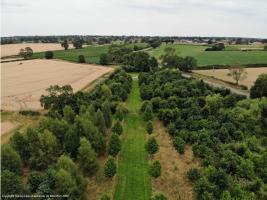
Located on the A5199 Welford Road, between Foston Rd and Arnesby, The entrance location ///crew.broad.branch. SEE DETAILS BELOW...
more.jpg)
.The club continues to undertake a varied and active involvement with environmental projects - NEXT WORK PARTY DATE = 18th March 2024
more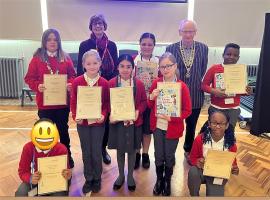
.Club President Stuart accompanied by Rotarian LInda, visited Knighton Mead Academy on 3rd March, to present Young Writer Awards.
more